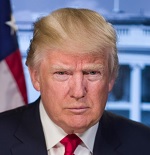Trump’s Fake Peace Deal With the Taliban

Donald Trump
Michael Hughes
March 3, 2020
The newly-inked U.S.-Taliban “peace” agreement – a pact that excludes the actual sitting internationally-recognized government of Afghanistan – will never bring peace to the war-torn country because it was never really designed to. The agreement and February 29 signing ceremony in Doha are all part of a publicity charade that will weaponize President Donald Trump’s re-election campaign, allowing the dealmaker-in-chief to claim U.S. troops are coming home.
On March 2, just two days after the signing ceremony, the Taliban announced an end to a very temporary ceasefire. Meanwhile, on that very same day, three civilians were killed in a bomb blast at a soccer match in Afghanistan’s eastern Khost province.
Then again, the peace deal says nothing about actually halting the war. It does not even encourage the extension of the now-broken seven-day “reduction in violence” truce. The agreement does say that, “a permanent and comprehensive ceasefire will be an item on the agenda of the intra-Afghan dialogue and negotiations,” which are allegedly to take place on March 10.
“An item on the agenda” – how reassuring.
Not to mention, Kabul and the Taliban are already resisting implementing key terms of the deal, including a prisoner swap and dialogue.
The deal, however, is quite explicit about the U.S. exit, underscoring that it covers all personnel.
“The United States is committed to withdraw from Afghanistan all military forces of the United States, its allies, and Coalition partners, including all non-diplomatic civilian personnel, private security contractors, trainers, advisors, and supporting services personnel within fourteen (14) months,” text of the deal posted on the State Department’s website says.
On the other hand, so be it. For the first time the U.S. seems truly committed to leaving Afghanistan. The agreement is free of disclaimers and caveats like tying the withdrawal to “conditions on the ground.”
Besides, the war will continue with or without the United States. Moreover, if one believes the U.S. presence in Afghanistan – and the military operations that accompany that presence – are simply another destabilizing factor, any U.S. troop exit is a good exit.
However, the problem is not the removal of U.S. troops – which should be applauded. The problem is bargaining away Afghanistan’s political future without feedback from any Afghan residents who are not part of a foreign-born radical religious movement.
There is no need to grant the Taliban legitimacy. No need to essentially gift political power to a group, created by Pakistan’s deep state in the early 1990s, that is even less popular among Afghans than the corruption-laden Ghani administration.
And there is no need to insult everyone’s intelligence by including clauses alleging the Taliban will cut ties with al-Qaeda.
On February 20, The New York Times allowed Taliban deputy leader Khalifa Serajuddin Haqqani to pen a propaganda piece ahead of the signing ceremony that claimed concerns about Afghanistan being used by “disruptive” groups to threaten world security are “politically motivated exaggerations.”
Haqqani, by the way, has closer ties to al-Qaeda than any other single Taliban leader, a reality adeptly captured by Keith Rose, a surgeon who worked in Afghanistan and Pakistan for fifteen years.
“Have the deal-makers explained to the president [Trump] that one of the suicide bomb trainer teams working with Serajuddin is the Qari Zakir network?” Rose wrote in an article for Newsweek on March 1. “It is actually a part of core al-Qaeda, which is just subcontracting with Khalifa. It is hard to overestimate just how deeply involved Serajuddin is with some of the most dangerous Islamic militancy on the planet.”
The deal itself also violates Afghanistan’s national sovereignty by suggesting that a new government will be created that would override the very democratic process the United States forced the Afghans to implement in the first place.
“The United States and the Islamic Emirate of Afghanistan which is not recognized by the United States as a state and is known as the Taliban seek positive relations with each other and expect that the relations between the United States and the new post-settlement Afghan Islamic government as determined by the intra-Afghan dialogue and negotiations will be positive,” the text of the deal says.
The deal also calls on the United States not to interfere in Afghan affairs despite the fact the very agreement itself basically represents, well, foreign interference in Afghan affairs.
Of course, one could argue that the Ghani government is part of the lineage that began with Hamid Karzai – Afghanistan’s modern-day Shah Shuja. Ironically, the American puppet master who enthroned Karzai in 2003, State Department envoy Zalmay Khalilzad, is also the architect of the endeavor to empower the Taliban.
Point being, the Trump administration is now forcing the U.S.-installed client state in Kabul to share power with an arm of Rawalpindi. Hence, at the end of the day, the intra-Afghan talks could essentially pave the way for a power-sharing deal between puppets.
In the end, it amounts to a political victory for the Trump administration, the Taliban and Pakistan’s deep state. Meanwhile, the people of Afghanistan have no say – their futures sacrificed to boost an American reality TV star’s campaign talking points.
